News & Events in Belarus
Lukashenko meets with head of Russia’s Chuvashia
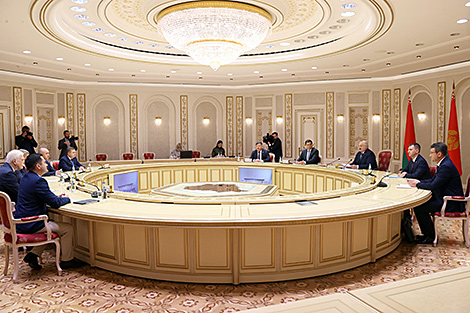
MINSK, 15 July (BelTA) – Belarus and Russia’s Chuvash Republic can double mutual trade by the end of 2024, Belarusian President Aleksandr Lukashenko said as he met with head of this Russian region Oleg Nikolayev at the Palace of Independence in Minsk on 15 July, BelTA has learned.
The Belarusian head of state, greeting the politician, noted that Oleg Nikolayev was visiting Belarus as head of the Chuvash Republic for the first time.
According to the president, the Chuvash Republic is still a new but very promising partner for Belarus. “In 2023, the trade amounted to only $122 million. In 2022 it was about the same amount. I think we should double the trade following this visit,” the Belarusian leader emphasized.
Aleksandr Lukashenko traditionally outlined promising areas where the intensification of bilateral cooperation met mutual interests.
Manufacturing sector
The Chuvash Republic makes it into Russia’s top ten regions, and even is among top three by such indicators as industrial production growth and manufacturing sector, the head of state said.
“Belarus is ready to expand the existing cooperation and is ready to implement new projects, which we will surely agree upon as part of this visit,” the president said, mentioning existing areas of interaction.
Belarusian tractor makers and engine manufacturers supply components and engines to the assembly lines of the Cheboksary Industrial Tractor Plant. MZKT (Minsk Wheel Tractor Plant) chassis are in demand at the Shumerlya Special Vehicles Plant. MAZ (Minsk Automobile Plant) makes a tailored all-wheel drive version of the wheelbase for Chuvashia. A number of Belarusian enterprises supply components for Chuvashia's electrotechnical cluster. “We enjoy a long-standing and solid industrial integration and cooperation,” Aleksandr Lukashenko said.
The president sees growth drivers primarily in the machine-tool industry: “We are ready to develop and produce for you the whole range of machine tools for metalworking. I think that if you offer us new areas of cooperation, taking into account our competencies, we will gladly agree.”
Transportation and machinery building
Belarusian passenger vehicles are well-known to Chuvashia, the head of state said. MAZ trolleybuses assembled at the Ufa plant are used in Cheboksary. This year, the contract for almost 100 new vehicles has been supplemented by another 40.
“I know that the region is actively buying Belarusian trucks, agricultural, municipal, road and special-purpose machinery. We have something to offer you, especially since the model range is regularly updated,” Aleksandr Lukashenko said.
The president added that the program of the visit of the delegation of the Russian region would include tours of such enterprises as MAZ, MTZ, Belkommunmash, and Amkodor. “You will be able to assess and test all the novelties. You will have an opportunity to both study and order the necessary equipment, units, and components,” the head of state said.

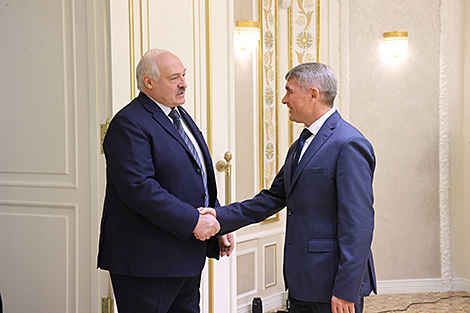
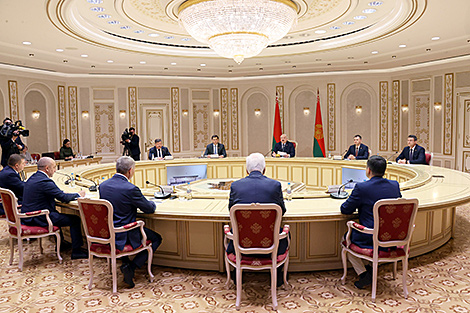
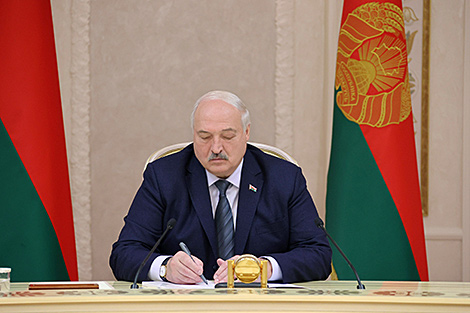

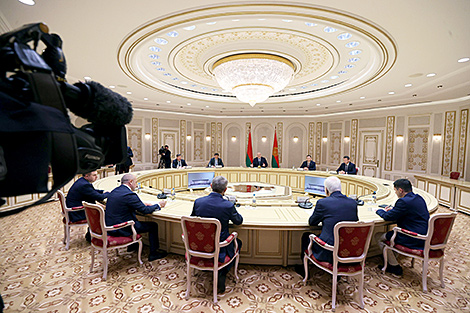
Agro-industrial complex
The parties praised active development of agriculture both in Chuvashia and Belarus. Chuvashia builds cattle-breeding complexes. In this regard, the president emphasized Belarus' readiness to participate in the construction of modern turnkey livestock and poultry farms and share technologies. According to Aleksandr Lukashenko, Belarus has made serious progress in this area and has good experience and competencies.
The Russian region may also be interested in the products of the Belarusian National Biotechnology Corporation, which produces mixed fodder and premixes for all areas of animal husbandry, including fish farming. The products are of high quality and have very few analogues. For example, there is a similar production in Russia's Shebekino. “I know that the situation there is not easy. If you need our company, similar to the one in Shebekino, to work in Russia, including Cheboksary, we can do it,” the president said.
Belarus produces excellent veterinary drugs, and is willing to continue cooperation in selective seed breeding. Belarusian scientists have already been helping their colleagues in Chuvashia to grow potatoes of domestic varieties and are interested in expanding cooperation, increasing the list of crops. “After the collapse of the [Soviet] Union, we retained all the institutes in the Academy of Sciences, including the Institute of Potato Breeding. This means that we renew and exchange our potato varieties every year,” Aleksandr Lukashenko said. According to him, all new varieties are tested at the personal land plot of the head of state. “If academicians say that some variety is good, I offer then to plant it at my land plot to see the result. I must say that I have never been disappointed in their work. You are doing the right thing to use the experience of Belarusian scientists. You can count on us if you need anything like this,” the president said.
Belarus is showing interest in Chuvashia's success in reviving the production of hops, a crop that is still little cultivated in our country. “We need this experience. If you share it with us, we will appreciate this very much,” Aleksandr Lukashenko emphasized.
The president noted the country's readiness to increase supplies of Belarusian foodstuffs to Chuvashia. “I know you have made good progress in this regard. We are also ready to consider food imports from your region,” the head of state said.
Humanitarian sector
Aleksandr Lukashenko also believes it is necessary to enhance cooperation in the humanitarian sector, including science, education, culture and sports. “We will not have any problems here,” the Belarusian leader said.
The president emphasized the reliability of Belarus in fulfilling its partnership obligations. “I want you to know that everything we agree on will be fulfilled in full,” the head of state said. “If there are any issues on which we should make a decision right now, I will do it with great pleasure. If not, stay for a while here, visit production facilities, enterprises, talk to the government members and make the corresponding decisions,” the head of state said.
Construction and healthcare. Additional proposals for cooperation from Chuvashia
Oleg Nikolayev thanked Aleksandr Lukashenko for close attention to the interaction with Russian regions and, in particular, with the Chuvash Republic as part of integration processes. “Thanks to this, our areas of interaction are constantly expanding and deepening,” he said.
A large delegation of more than 70 specialists of Chuvashia arrived in Belarus, the head of the Russian region said. “In addition to the areas you have mentioned, we have made serious progress in the areas of construction and healthcare. We see great prospects here for mutually enriching and supporting each other,” Oleg Nikolayev said.
A lot of facilities are built in Chuvashia on the instructions of the Russian president. Plans are in place to start the construction of a clinical hospital in the near future. In this regard, both Belarusian building competencies and construction materials may be in demand. “In certain areas construction materials will help replace imports and save money. We have made all necessary agreements here,” the head of the region said.
As for healthcare, there are two federal medical centers in Chuvashia. One is for eye microsurgery, the second is a center for orthopedics and endoprosthetics. “Here, colleagues have mentioned that joint replacements was a relevant matter for the residents of Belarus. We are ready to lend a helping hand here. If necessary, we are ready to receive up to 300 people from Belarus and provide high-tech medical care,” Oleg Nikolayev said.







 print version
print version make home page
make home page add to bookmarks
add to bookmarks

